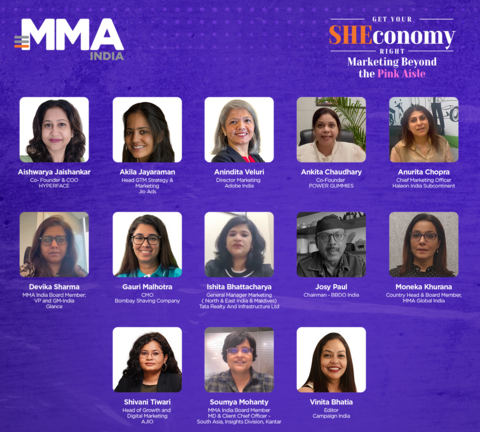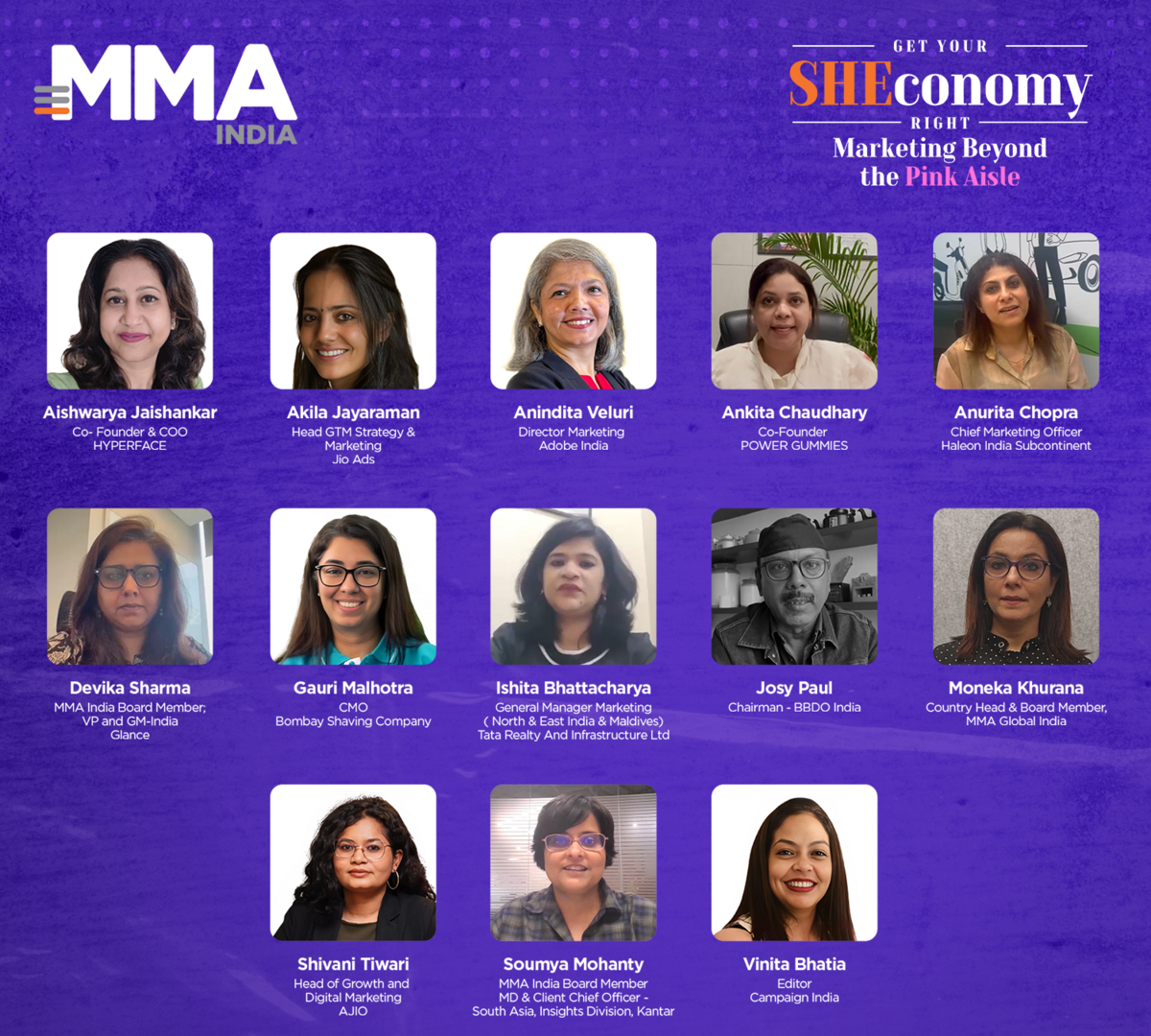March 13, 2025
Meta text - Industry leaders unite to rethink the ‘SHEconomy’ and reshape the future of female-focused marketing
In a world where women drive 70-80% of consumer purchases, why do so many brands still reduce them to stereotypical, ‘pink-washed’ narratives? MMA Global India’s Women’s Day 2025 campaign - "Get Your SHEconomy Right: Marketing Beyond the Pink Aisle" - throws a bold spotlight on this disconnect, calling for a fundamental shift in how brands engage with female consumers.
The campaign brings together some of India’s top marketers, agency leaders, and brand builders in an industry-first initiative aimed at breaking gendered marketing biases, challenging outdated norms, and elevating the economic power of women as consumers and decision-makers.
A Power-Packed Video Campaign From the ‘SHEcosystem’
As part of the campaign, MMA Global India released a thought-provoking video featuring prominent industry voices who are leading the charge in rethinking the ‘SHEconomy’. The video brings to the forefront hard-hitting questions on why brands continue to fall into outdated gendered marketing traps - and what needs to change.
Industry Leaders Featured in the Video:
- Moneka Khurana, Country Head & Board Member, MMA Global India
- Devika Sharma, MMA India Board Member; VP and GM - India, Glance
- Anindita Veluri, Director - Marketing, Adobe
- Ishita Bhattacharya, GM, Marketing & Brand Head North/East India & Maldives, Tata Housing
- Josy Paul, Chairman, BBDO India
- Ankita Chaudhary, Co-Founder, Power Gummies
- Anurita Chopra, Chief Marketing Officer, Haleon India Subcontinent
- Soumya Mohanty, MMA India Board Member; MD & Client Chief Officer - South Asia, Insights Division, Kantar
Key Insights From the Leaders:
- Outdated stereotypes persist - women are still assumed to prefer simpler, less tech-heavy products, despite being key decision-makers in finance, real estate, and auto.
- Marketing must shift from assumptions to data - women are diverse in needs and motivations; brands need to segment them based on behavior, not broad-stroke personas.
- Authenticity drives engagement - community-building, social storytelling, and personalization are key to capturing female consumers beyond transactions.
- Brands that challenge societal norms see real impact - they have proven to not just sell, but reshape cultural attitudes toward domestic chores.
Each leader challenged industry conventions, debunked outdated marketing tropes, and emphasized why brands must stop viewing female consumers through a singular lens.
LinkedIn Café: A Live Industry Dialogue on the SHEconomy

To deepen the conversation, MMA Global India also hosted an exclusive LinkedIn Café session on the same theme. This interactive discussion brought together some of India’s sharpest marketing minds to dissect the challenges and opportunities in female-centric marketing today.
The session tackled six hard-hitting questions that challenged brands to think beyond gender stereotypes and build marketing strategies that genuinely resonate with modern women.
Industry Leaders on the Panel:
- Moneka Khurana - Country Head, MMA Global India
- Aishwarya Jaishankar - Co-Founder & COO, Hyperface Technologies
- Gauri Malhotra - CMO, Bombay Shaving Company
- Ankita Chaudhary - Co-Founder, Power Gummies
- Ishita Bhattacharya - GM, Marketing & Brand Head North/East India & Maldives, Tata Housing
- Shivani Tiwari - Head of Growth and Digital Marketing, AJIO
- Vinita Bhatia - Editor, Campaign India
- Akila Jayaraman - Head GTM Strategy & Marketing, JioAds
Key Insights From the Discussion:
- How can we rethink marketing in traditionally female-associated categories to break free from the ‘pink aisle’?
- Women are not a monolith - marketing should move from gender-first segmentation to need-based engagement that reflects real consumer behavior.
- Representation vs. Portrayal - while female visibility in leadership has improved, advertising still stereotypes women in caregiving and domestic roles.
- Functionality over aesthetics - brands must ditch surface-level inclusivity (pink packaging, soft messaging) and focus on aspiration, performance, and relevance.
- Data-driven marketing is key - women drive 70-80% of household purchases, yet brands still rely on clichés instead of insights.
- Why do you think women’s financial, automotive, realty, and tech needs are often treated as an afterthought in marketing strategies?
- Legacy bias - industries have been historically built by men, for men, leading to a lack of female-centered product strategy.
- Women are the economic drivers - they are actively investing, buying homes, and making financial decisions, yet marketing still treats them as secondary influencers.
- New-age brands are closing this gap - D2C brands are now building products and services that cater to women as primary decision-makers, unlike legacy players.
- Marketing narratives need a reset - women are not just looking for basic savings plans or insurance; they want complex financial tools, real estate insights, and tech products designed with them in mind.
- In what ways can brands design and market products that empower women rather than reinforce stereotypes?
- Co-create with women, not just for them - brands need to include women in product development, strategy, and leadership roles.
- Gender-neutral branding is the way forward - products must be built for functionality, not color-coded assumptions.
- Insight-driven storytelling wins - empowerment is not a campaign theme; it’s about designing solutions that recognize women as decision-makers.
- More women in leadership, more relevant products - even women-focused apps lack female representation in product strategy, impacting relevance and user experience.
- What are some inspiring examples of brands and campaigns that truly tap into the SHEconomy?
- Nike’s ‘What Will They Say About You?’ - Redefined ambition and performance beyond gender norms.
- Ariel’s ‘Share the Load’ - Reframed domestic labor as a shared responsibility, moving away from reinforcing caregiving roles.
- SBI’s ‘She’s the Boss’ - Challenged finance stereotypes, positioning women as financial decision-makers, not dependents.
- Always ‘Like A Girl’ - Shifted cultural narratives by turning an insult into a statement of strength.
- New-age disruptors like BlissClub, GIVA, Cult Fit - Engaging progressive female consumers with messaging beyond stereotypes.
- What outdated marketing myths are holding back authentic engagement with women, and how can brands shift their strategy?
- Myth: Women are a niche market.
Reality: Women drive 70-80% of consumer spending - they are the economy, not a segment. - Myth: Women make decisions emotionally, while men are rational buyers.
Reality: Women are highly strategic consumers, doing extensive research before making purchases. - Myth: Representation alone equals engagement.
Reality: Real engagement comes from data-backed insights, product innovation, and storytelling that resonates with evolving female aspirations. - Myth: Women spend only on household needs.
Reality: Women prioritize themselves - investing in financial security, tech, automobiles, and experiences.
- How can marketers break free from one-size-fits-all approaches to genuinely connect with modern, empowered women?
- Hyper-personalization is key - AI and retail media now enable tailored targeting based on aspirations, behaviors, and life stages.
- Deep insights over assumptions - marketing must evolve from broad gender-based messaging to nuanced, data-driven engagement strategies.
- Authenticity in storytelling - brands must represent women as they are, not as outdated archetypes.
- Inclusivity starts at the source - real change will happen when women lead product strategy, creative direction, and decision-making roles inside organizations.
MMA Global India’s Women’s Day 2025 campaign was a movement. With brands still guilty of gender-washing and reducing women to archaic archetypes, this initiative serves as a wake-up call for marketers to treat women as powerful economic drivers, not just a segment.
As brands look ahead to a future where women are not just consumers but key decision-makers, the ‘SHEconomy’ is no longer just about representation - it’s about real business impact. The message is clear: Marketing needs to move beyond the pink aisle, or risk being left behind.
--------------------------------------------------
Catch the full Linkedin Conversation here.
Watch the videos here.


